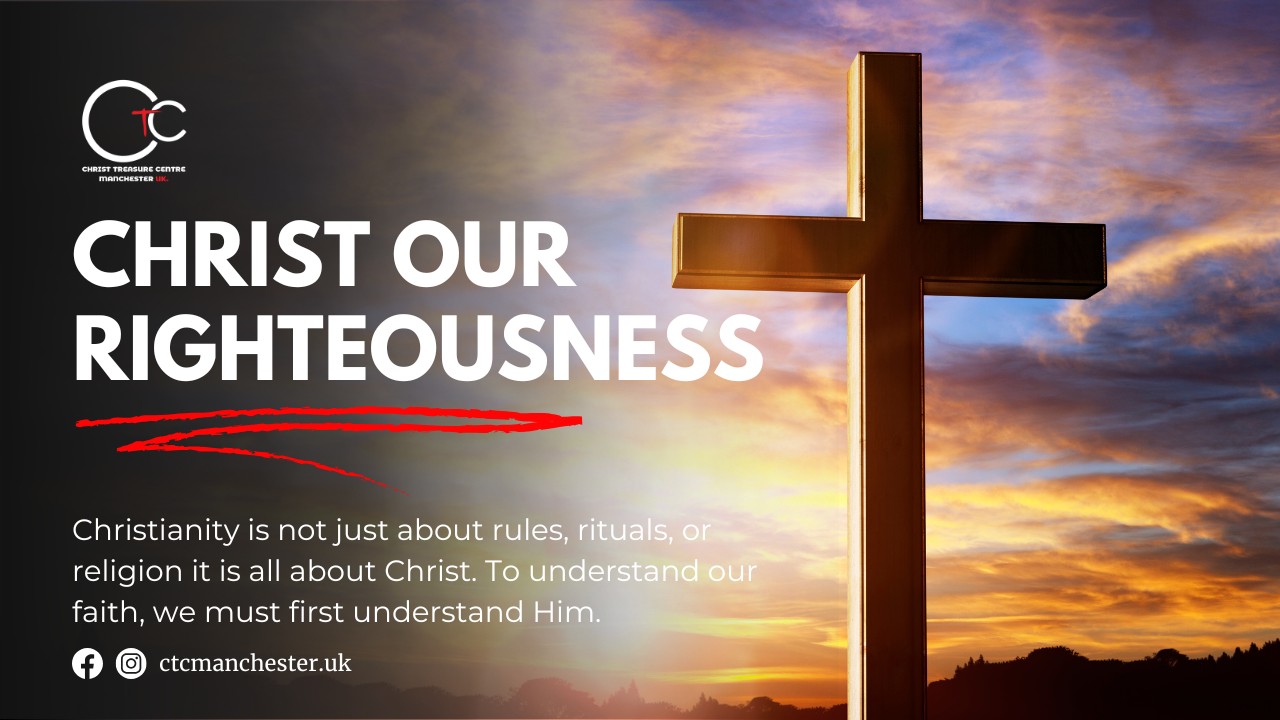Romans 1:16–17
At the heart of Christianity is a person Jesus Christ. Without Him, the Bible loses its meaning, salvation is impossible, and life itself has no true purpose. Christianity is not just about rules, rituals, or religion it is all about Christ. To understand our faith, we must first understand Him.
The Apostle Paul reminds us in Romans 1:16–17 that the gospel is the power of God unto salvation, and in it “the righteousness of God is revealed from faith to faith.” Righteousness simply means having a right standing before God. It is the confidence to come before Him without guilt, shame, or condemnation. The good news is that this righteousness is not something we earn by works; it is something we receive by faith.
Two Kinds of Righteousness
The Bible shows us that there are two kinds of righteousness.
1. Our Own Righteousness (by the Law and works).
Paul speaks of this in Philippians 3:9 “not having my own righteousness, which is of the law.” Israel struggled with this, as Paul explained in Romans 10:1–3. They had zeal for God but tried to establish their own righteousness instead of submitting to God’s. Scripture is clear: “all our righteousnesses are as filthy rags” (Isaiah 64:6).
The law exposes this weakness. James 2:10 says, “Whoever shall keep the whole law, and yet stumble in one point, he is guilty of all.” Even a devout and charitable man like Cornelius in Acts 10—who prayed, gave generously, and feared God—was not declared righteous until he believed in Christ. Human effort can never make us right with God.
2. God’s Righteousness (through faith in Christ).
Paul continues in Philippians 3:9“…but that which is through the faith of Christ, the righteousness which is of God by faith.” This righteousness is freely given, apart from the law, as explained in Romans 3:19–22. If righteousness could come by keeping the law, then Christ’s death was pointless (Galatians 2:21).
The Limitation of the Law
The law was never meant to save us. Instead, it was given to reveal God’s holiness and to show us our need for a Savior (Romans 3:19–20). It could expose sin, but it could not remove it. Hebrews 7:19 says, “The law made nothing perfect.” Galatians 3:21 adds that if a law could have given life, righteousness would truly have been by the law. The law shows us our inability so that we will run to Christ.
Christ: Our Righteousness
This is why the Bible calls Him “The LORD our Righteousness” (Jeremiah 23:6). Paul declares in 1 Corinthians 1:30 that Christ has been made unto us “wisdom, and righteousness, and sanctification, and redemption.”
On the cross, God made Him who knew no sin to be sin for us, so that we might become the righteousness of God in Him (2 Corinthians 5:21). The prophet Isaiah foresaw this when he wrote: “He was wounded for our transgressions, He was bruised for our iniquities… and the Lord has laid on Him the iniquity of us all” (Isaiah 53:4–6). Peter echoes this truth: Christ “bore our sins in His own body on the tree” (1 Peter 2:24).
Old Testament Shadows
From the beginning, God pointed His people toward the sacrifice of Christ. The sin and trespass offerings in Leviticus 4 were all pictures of Jesus. When Adam and Eve sinned, God clothed them with garments of skin, showing that blood had to be shed (Genesis 3). And Abraham “believed God, and it was counted unto him for righteousness” (Genesis 15:6). Righteousness has always come by faith, not by works.
Living Out This Righteousness
For us today, this means that we do not live holy lives in order to become righteous we live holy lives because we already are righteous in Christ. Our good works are not the foundation of salvation; they are the fruit of it.
This understanding removes fear and condemnation. “There is therefore now no condemnation to those who are in Christ Jesus” (Romans 8:1). Our boldness in prayer and confidence before God are not based on our performance, but on Christ’s finished work.
Our Response
How should we respond? By receiving this gift of righteousness with thanksgiving, resting in Christ’s finished work, and living in obedience out of love not fear. When we truly grasp that we are the righteousness of God in Christ, it frees us to live with joy, boldness, and victory.
Let this be our daily confession:
- I am the righteousness of God in Christ (2 Corinthians 5:21).
- I am accepted and loved by my Father (Ephesians 1:6).
- I come boldly into His presence through the blood of Jesus (Hebrews 10:19).
- My confidence is not in myself, but in Christ alone (Philippians 3:9).
Through Christ our righteousness, we stand complete and secure before God.







